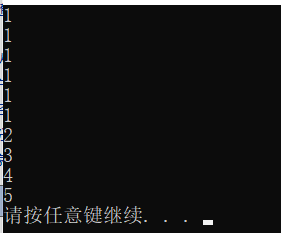人们总说时间会改变一些,但实际上这一切还得你自己来。
一.概念详解
变量:计算机语言中储存计算结果,其值可以被修改。通过变量名来访问计算机中一段连续的内存空间。
属性:区别于同类事物的特征。
C语言中变量的属性关键字有:auto register static extern
二.属性关键字详解
①auto
用于修饰局部变量的默认属性修饰关键字,表明将自动变量表明存储在栈中。
@note:auto只能修饰局部变量,修饰全局变量会报错。
1 #include <stdio.h> 2 auto int var=1; //err: auto不能修饰全局变量。 3 int main(){ 4 printf("%d\n",var); 5 return 0; 6 }

②register
用于向编译器申请将局部变量放入寄存器区域,不一定请求成功。
1 #include <stdio.h> 2 register int var=1; //err: register name not specified for 'var' 3 int main(){ 4 register int i=1; 5 printf("%d\n",&i); //err:address of register variable 'i' requested 6 printf("%d\n",var); 7 return 0; 8 }
@note:不能利用取地址运算符&,来获得寄存器变量的地址。
③static
将变量存储到静态区域。
修饰全局变量:将静态全局变量的作用域缩小到定义文件。
修饰局部变量:将静态局部变量存储到静态区域,延长局部变量的生命周期。
修饰函数:静态函数作用域只是声明的文件中。
1 #include <stdio.h> 2 int f1(){ 3 int i=0; 4 i++; 5 return i; 6 } 7 int f2(){ 8 static int i=0; 9 i++; 10 //k++; //err:'k' undeclared (first use in this function) 11 return i; 12 } 13 int main(){ 14 int j=0; 15 static int k; 16 for(j=0;j<5;j++) 17 printf("%d\n",f1()); 18 for(j=0;j<5;j++) 19 printf("%d\n",f2()); 20 return 0; 21 }

④extern
用于声明外部的变量或函数,告知编译器在其他文件中寻找该变量或函数定义。
扩展:C与C++语言之间的桥梁,告知C/C++编译器以C语言编译方式编译。
1 #include <stdio.h> 2 extern int i; // 3 int main(){ 4 printf("%d\n",i); //告诉编译器i在其他地方可以找到。 5 return 0; 6 } 7 int i=99;
三、extern和static的互斥关系
extern用于引用外部的,也即其他文件中的全局变量或函数。而static修饰的全局变量作用域被限定在本文件内,故而使用extern关键字引用其他文件的静态全局变量是不行的。
test1.c
1 #include <stdio.h> 2 extern int i; 3 int main(void){ 4 printf("%d\n",i); 5 return 0; 6 }
test2.c
1 #include <stdio.h> 2 static int i=99;
报错err:undefined reference to `i'
extern可与static结合使用,屏蔽test2代码中的实现细节,只提供一个函数接口给其他人使用,可有效防止泄密。
使用示例:
1 #include <stdio.h> 2 extern int getI(); 3 extern int putI(int j); 4 int main(void){ 5 int i; 6 i=getI(); 7 printf("%d\n",i); 8 scanf("%d",&i); 9 putI(i); 10 i=getI(); 11 printf("%d\n",i); 12 return 0; 13 }
1 #include <stdio.h> 2 static int i=99; 3 int getI(){ 4 5 return i; 6 } 7 int putI(int j){ 8 i=j; 9 return 0; 10 }